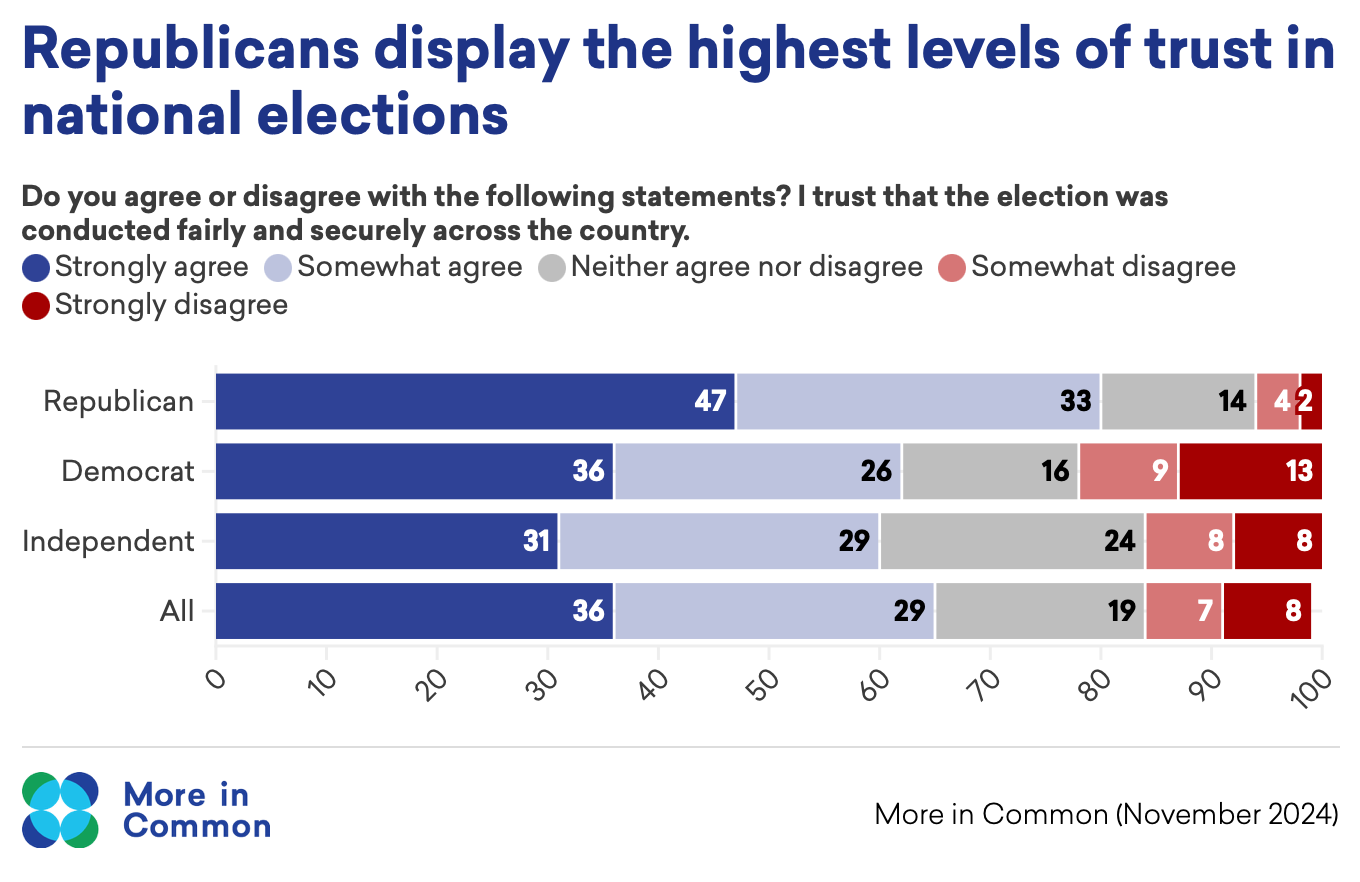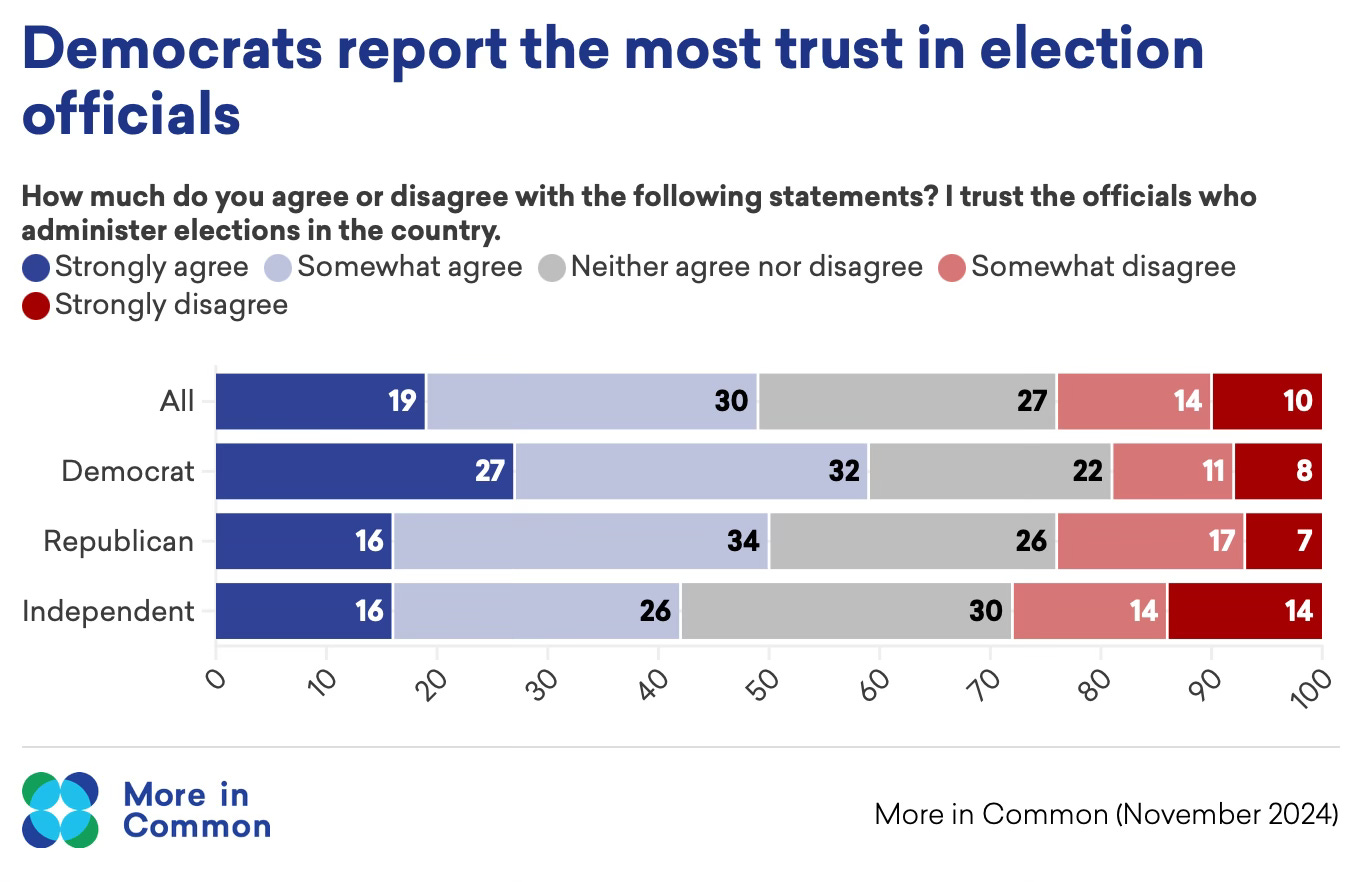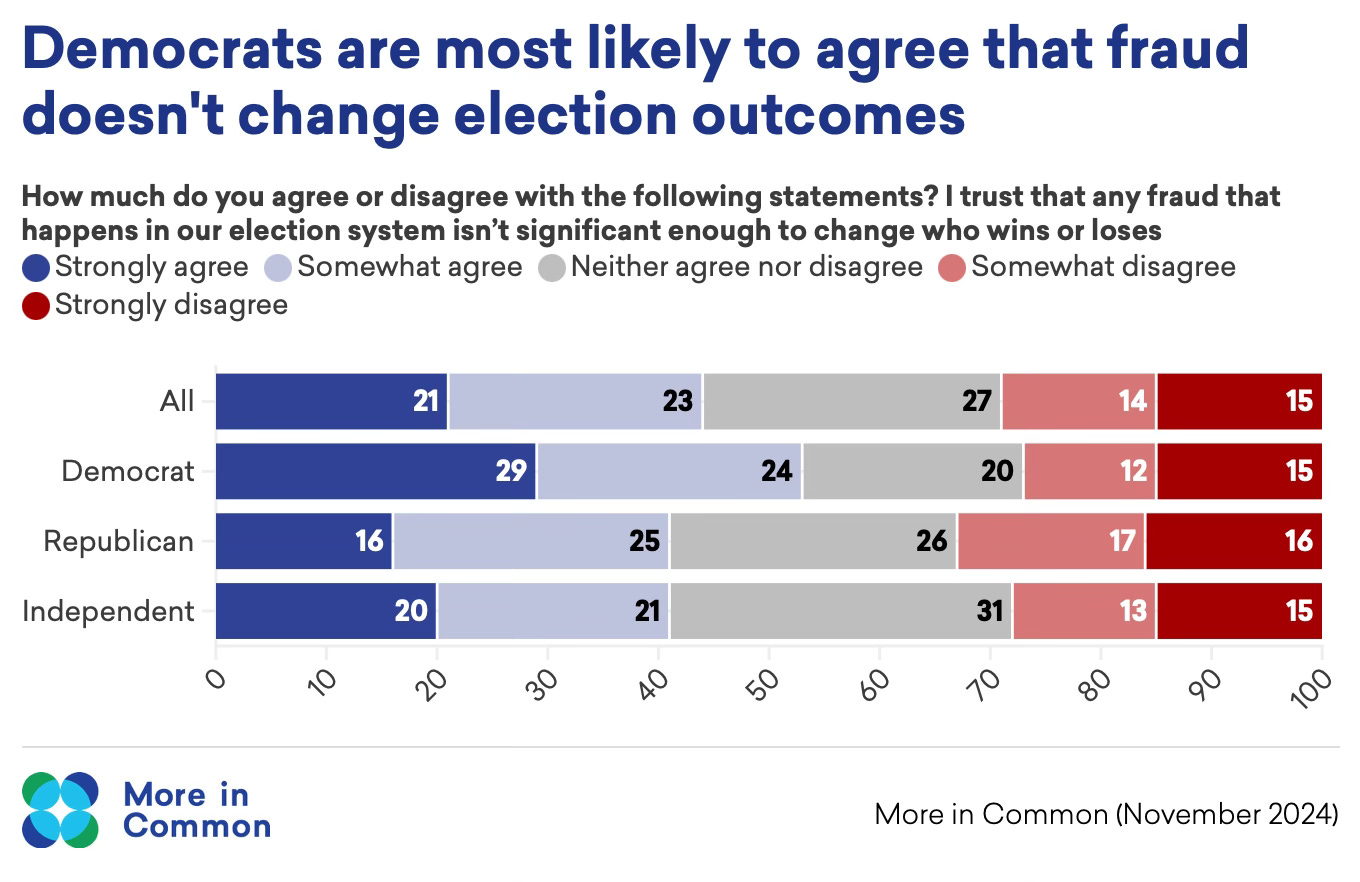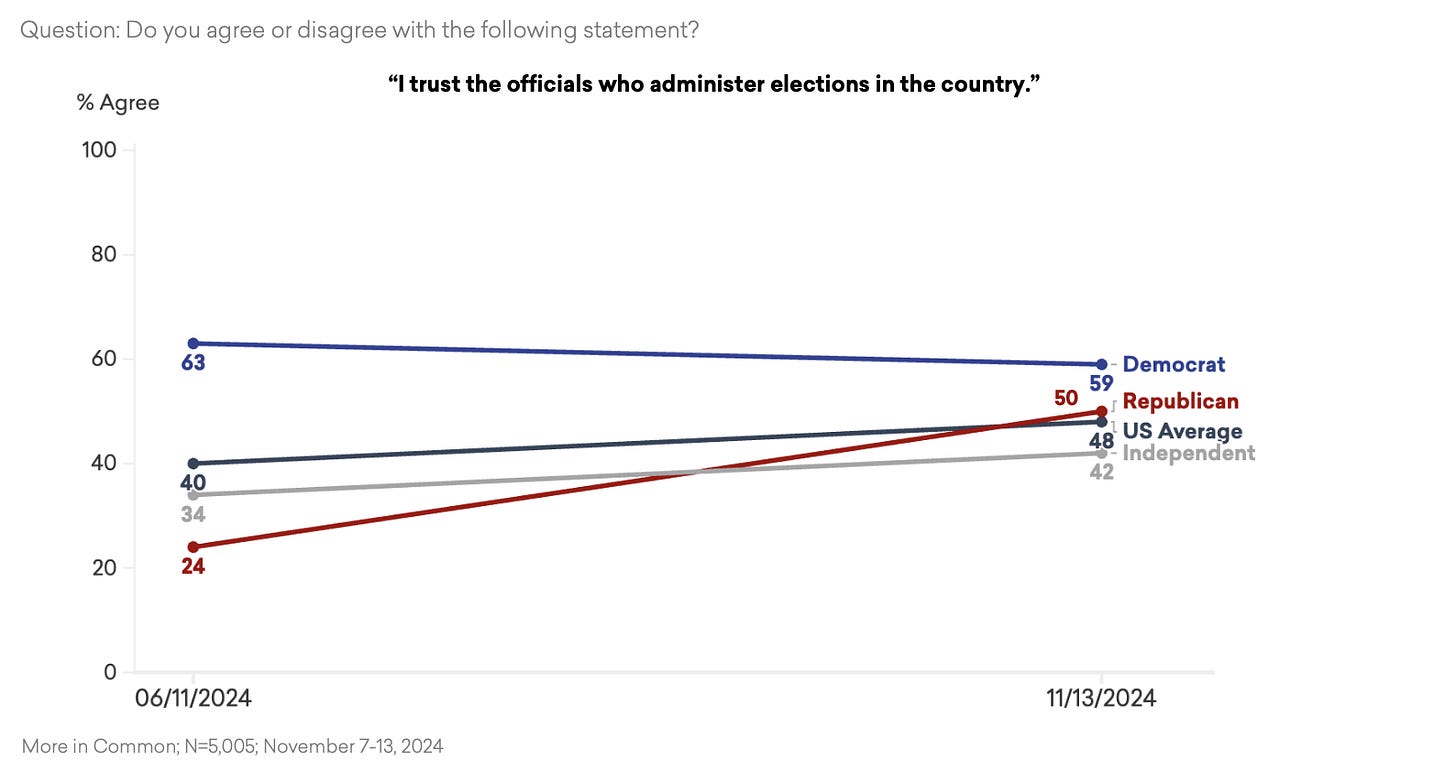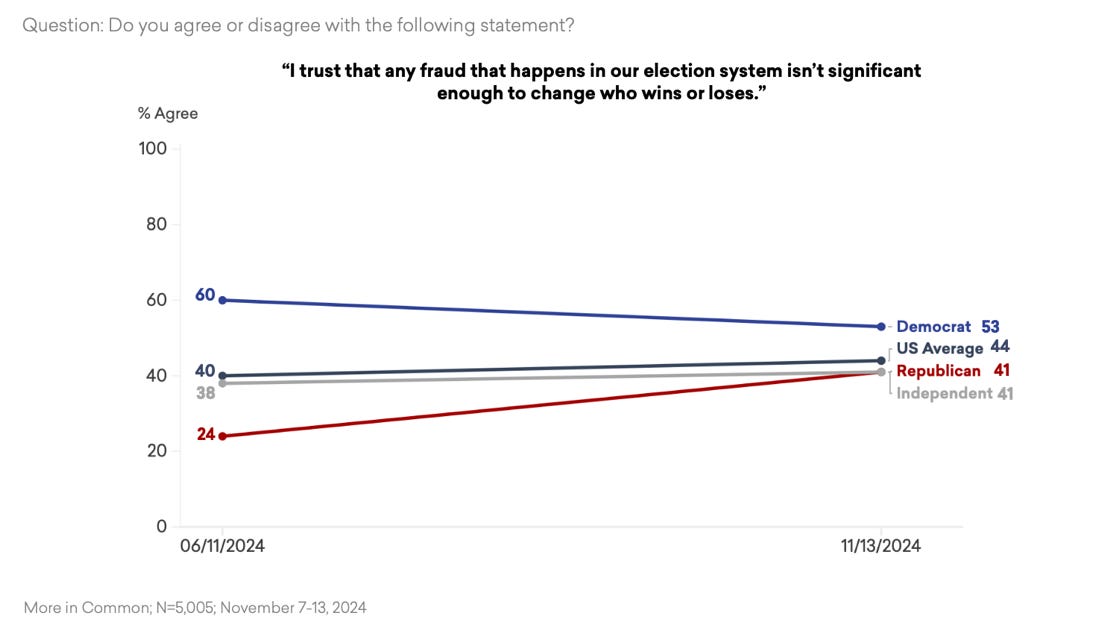January 6th and Americans' trust in elections
Summary: As we reflect on the significance of January 6th, 2021, we share insights on how Americans feel about the 2024 election process. We find that a majority of Americans believe that the 2024 election was conducted “fairly and securely” – and Republicans display significantly higher levels of trust than Democrats and Independents. When it comes to trusting specific aspects of the election process, however, Democrats tend to be more trusting than Republicans and Independents. This analysis is based on our post-election poll in November, which we’ve written about in the Atlantic and in previous posts. You can find our full report here.
Today, Congress meets to certify the electoral college votes—a process relatively unnoticed by the American public until 2021, when supporters of then-President Trump attacked the Capitol that resulted in a violent effort to halt the certification process.
In the four years since, the United States has entered a period of unprecedented questioning – and undermining – of our election processes. Threats to election workers rose to alarmingly high levels. Secretaries of state across the country were forced to invest in robust security measures to ensure the safety of our elections and those who administer them. Foreign interference remains a serious threat.
Yet some of this newfound scrutiny of our election process has been positive. Congress passed the bipartisan Electoral Count Reform Act, which provides much needed updates to antiquated laws governing the process of casting and counting electoral votes. Local media and community leaders stepped up to provide accurate and educational information about state voting processes. And civil society undertook a massive effort to recruit trusted poll workers – like Vet the Vote, who recruited over 140,000 veterans engaging new and creative partners, such as the NFL, in their efforts.
Election certification marks one of the final steps in our presidential election—a process that given the headwinds, remarkably and relatively seamlessly produced our 47th president as intended. Yet the questions of function and trust are distinct. How do Americans feel about our election processes after the 2024 election?
Our survey data comes from our post-election poll conducted in November, surveying 5,005 Americans, and our quotes come from our Americans in Conversation panel.1 Our previous post-election analyses focused on Americans’ perception gaps and disengaged Americans. Here, we’ll focus on the results from our questions about trust.
1. Two-thirds of Americans trust that the 2024 election was fair and secure, and even more Republicans agree.
We found that a majority of Americans agreed that the 2024 election was “fair and secure” at both the local (69%) and national levels (66%).
Rates of confidence were higher for Republicans than Democrats and Independents, both at the local and national level. For instance, 80% of Republicans agreed that the national election was conducted “fairly and securely” while only 62% of Democrats and 60% of Independents did – nearly a twenty-percentage point gap.
“I think I have more trust, as I saw that they did a great job and they are auditing more results now than they have in the past.”
💬 Ryan, 65-year-old white man, Traditional Conservative, Republican from Fort Worth, Texas
“I feel more confident after seeing how smoothly things ran compared to last election.”
💬Diego, 37-year-old Hispanic man, Disengaged, Independent from Ft. Lauderdale, Florida
“I have less trust. Republicans were allowed to cheat with the Elon Musk 1 million dollar lottery. It was reported that address of voters in Fulton county, GA was changed so they would have a hard time voting.”
💬 Maud, 52-year-old Black woman, Moderate, Democrat from Columbia, South Carolina
“Less trust. I cannot see how Trump did such a clean sweep without rigging the election. It seems unrealistic, but I do question it now.”
💬Connor, 40-year-old white man, Moderate, Democrat from Winston Salem, North Carolina
2. When it comes to trusting election officials or the influence of fraud, Democrats are more trusting than Republicans and Independents.
Almost half of Americans trust their election officials (49%), while 24% do not (the remaining 27% “neither agree nor disagree” indicating that some do not hold strong opinions one way or another about their election officials). Yet 59% of Democrats trust their election officials – higher than the national average. Meanwhile, 50% of Republicans and 42% of Independents trust their election officials.
“I do not trust most of the elected officials in my state. They will stop at nothing to win. They are as crooked as they come, don't represent the people, love to be in power and I can't figure out how they keep getting elected.”
💬Dia, 56-year-old white woman, Traditional Conservative, Republican from Roseville, California
“I trust the poll workers and the ballot counters to do the right thing. I don't think any single person could have a material affect on the election results.”
💬 Blake, 37-year-old white man, Disengaged, Democrat from Dayton, Minnesota
Similarly, when asked whether the influence of fraud changes election outcomes, 44% of Americans don’t think so (roughly two times higher than those who disagree). Democrats again displayed higher rates of confidence (53%) than Republicans (41%) and Independents (41%).
“There is zero chance that every ballot that will be cast will be legit. That could be because someone other that the person whose name is on the ballot actually cast it, it could be because ballots get ‘lost.’ It could be as blatant as cheating and stuffing them full - which was done in 2020.”
💬Kris, 55-year-old white man, Devoted Conservative, Republican from Bellevue, Washington
3. Yet Republicans’ trust levels are catching up: their trust in elected officials increased and concerns about fraud decreased significantly after the election.
While Republicans report lower levels of trust in election officials than Democrats do, their trust levels doubled from June (24%) to November 2024 (50%). Independents’ trust in election officials also rose, albeit at less dramatic levels from 34% to 42%. Democrats had relatively no change.
When asked about fraud, Republicans display similar trends. While only 24% of Republicans agreed that fraud doesn’t change outcomes in June, 41% agreed in November – a 70% increase. Democrats and Independents, meanwhile, did not display significant changes.
“I have more trust, simply because of what happened 4 years ago, I think the election procedure has been a lot more scrutinized, and of course regulated to ensure there is no voter fraud.”
💬Lily, 44-year-old white woman, Traditional Conservative, Independent from Glen Ellyn, Illinois
“I have more [trust] now. Either the flaws that existed in 2020 were fixed this time, or the landslide for Trump this time was just "too big to rig."”
💬 Peter, 45-year-old white man, Devoted Conservative, Independent from Saint Louis, Missouri
Conclusion
What do these beliefs indicate about trust in elections? First, those working tirelessly to ensure safe and secure elections should feel proud of their efforts. Americans overall believe they were conducted fairly and securely.
Moreover, perceptions of election security are not sticky, or permanent: Americans’ opinions can, and do, change. Yet these changes may be mediated by party affiliation, suggesting that trust may be connected to preferred electoral outcomes. President Trump’s campaign strategy focused on sowing election doubts ever since 2020 – and as our research shows, Republicans were much less likely to trust election processes leading up to the 2024 election.
Republicans’ dramatic increases in trust may simply be because the election produced a favorable outcome. Once the election results became clear, social media posts speculating about the election fraud dramatically reduced. Meanwhile for Democrats, trust levels remained high both pre- and post-election.
Beyond campaign messaging, increasing political segregation could mean Americans find support for opposing candidates simply unbelievable. In our post-election poll, 82% of Democrats felt that they “could not understand how someone would vote for Donald Trump,” while 72% of Republicans felt the same about Kamala Harris.
Perhaps most importantly, people’s trust differs based on the what part of the election is in focus. Republicans are more likely than Democrats or Independents to trust the 2024 election was run fairly and securely, but less likely to trust elected officials or the risk of fraud.
Trust in our election processes is critical. As we close the chapter on the 2024 election, we must leverage the trust we have now for the countless elections that will follow. Our democracy will depend on it.
We can’t do this without you!
MIC regularly conducts research that sheds light on both cross-group misperceptions and common ground. Consider supporting our work by making a donation.
📩 Know someone who may enjoy our newsletter? Have them sign up here.
📝 If you want to read our past newsletters, go to our homepage.
📊 Read all of our reports at www.moreincommonus.com
From October 18-21, 2024, More in Common asked their “Americans in Conversation”qualitative research panel, which is roughly representative of the American population, to share their perspectives regarding their trust in the security of the American electoral processes. We asked three questions gauging respondent trust in poll workers and the overall fairness of the elections, and tested five messages regarding trust in vote counting, information accuracy, media divisiveness, presidential behavior, and civil violence. MIC then asked the same eight questions of the AIC panel from November 8-13, 2024, to determine how respondent trust in the electoral processes may be impacted by the election and its results. 196 U.S. adult respondents completed both activities.




